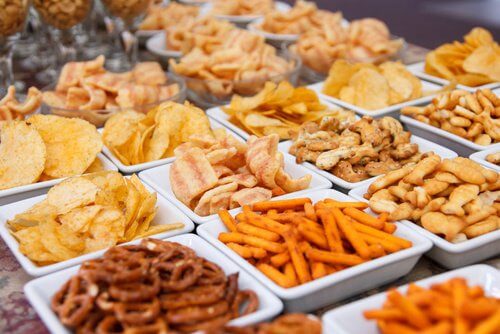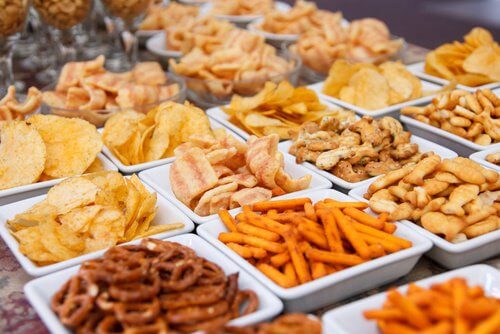6 Eating Habits that Cause Anxiety and Depression

Many people usually think that a healthy diet gives us a slim, healthy body. However, this isn’t the only benefit that you get from good eating habits. Eating a healthy diet also helps you to have a healthy mind and get rid of anxiety and depression.
Of course, there are many factors that influence when you really feel good. However, some days you may feel slow, tired, sad, or unmotivated without any obvious reason.
Because of this, you should know about the relationship between your eating habits and both anxiety and depression.
Eating Habits that Cause Anxiety and Depression
1. Caffeine dependence

Sometimes, coffee is the only thing that keeps you moving through the day. In the morning, you probably drink a cup of coffee before work. Then, you drink another at noon your spirit and keep your routine going.
Unfortunately, caffeine can have toxic effects on your brain and may cause anxiety and depression.
When you use it constantly, it becomes a daily necessity. Your body starts to make it fundamental to functioning. Because of this, when there is an absence of caffeine, your serotonin levels fall. This causes anxiety, irritability, and a lack of concentration.
This is a bad habit that you should quit as soon as possible.
2. A diet with too much sugar

Today, people consume an average of 16 tablespoons of sugar per day. Eating foods that have too much sugar is one of the worst habits for your health.
The main thing sugar does is affect your serotonin levels. Serotonin is, at its base, a hormone that regulates several bodily functions.
These include:
- Sleep cycles
- Controlling pain
- Mood
- Digestion
Low levels of this hormone are associated with anxiety and depression.
On the other hand, as arterial pressure rises, so does your body’s production of the stress hormone cortisol. This can also increase thyroid hormone production and cause problems for your digestive system.These problems include running the risk of having reproductive, fertility, and involuntary abortion problems.
Don’t miss this article:
6 Signs You’re Eating Too Much Sugar
3. Drinking alcohol

Most people know that alcohol is a depressant.
Even so, we’re all tempted to drink a few glasses more without realizing the consequences. And after that, there’s the famous hangover the next day.
Alcohol, besides just being a depressant, is also a stimulant.
This means that it suppresses your glutamate neurotransmitters. However, at the same time, it increases neurotransmitters that inhibit your immune system.
Because of this, your thoughts, speech, and movements will get slower. The more you drink, the stronger you will feel the effects.
This is the reason that people appear aggressive or impulsive after drinking a little alcohol. As you can imagine, this can very negatively affect your mental health.
4. Eating too many fried foods

Everyone has had a bad day at one time or another. It’s normal that when you’re hurt, you turn to the things that make you feel better.
The most common foods in these cases are:
- Pizza
- Hamburgers
- French fries
- Chips
However, how many times have you eaten these things and truly felt better?
The truth is, fried food doesn’t just affect you in the moment. Afterward, you almost always feel the negative effects of what you’ve eaten.
Perhaps you’re accustomed to these bad eating habits. This could be because you don’t really know what these foods do to your mental health.
Fried foods are cooked with hydrogenated oils. They also contain trans fats which hurt your body and make you gain weight.
At the same time, they’re loosely associated with depression.
Also read:
6 Things You Should Start Doing to Lead a Healthier Life
5. Eating large amounts of salt

Some people like salt. If you’re one of them, you should know that eating too much salt is very bad for your general health.
Salt increases your blood pressure. This makes your heart work harder than normal.
In addition, when you eat so much salt, it’s likely that you’ll develop problems. These can be both physical and mental.
The most common problems are:
- Depression
- Feelings of frustration
- Tiredness
- Hostility
- Resentment
It’s important that you have a balanced amount of salt in your diet.
We know that food without salt isn’t as tasty. However, you should know that gradually changing this habit is very helpful.
6.Skipping breakfast

Some people don’t really like breakfast. However, did you know that breakfast is truly the most important meal of the day?
When you don’t eat breakfast, you reduce your brain functions. This is because you make it work without energy.
If you’re prone to suffering from depression, your brain needs all the energy possible to keep you up.
If you skip breakfast for a long time, your body gets used to not eating. That’s why you don’t feel hungry at this time of the day. This is one of the eating habits that could definitely result in a health problem like anxiety and depression.
Because of this, it’s always better for you to eat breakfast. Your body and mind will thank you!
All cited sources were thoroughly reviewed by our team to ensure their quality, reliability, currency, and validity. The bibliography of this article was considered reliable and of academic or scientific accuracy.
- Lazarevich, I., Irigoyen-Camacho, M. E., & Velázquez-Alva, M. del C. (2013). Obesity, eating behaviour and mental health among university students in Mexico city. Nutricion Hospitalaria. https://doi.org/10.3305/nh.2013.28.6.6873
- Schoenberg, P. L. A., & David, A. S. (2014). Biofeedback for psychiatric disorders: A systematic review. Applied Psychophysiology Biofeedback. https://doi.org/10.1007/s10484-014-9246-9
- Nmor, J. (2014). Eating Behaviours of University Students in Southern Nigeria: An Evaluation of Sex Differences. Science Journal of Public Health. https://doi.org/10.11648/j.sjph.20140201.14
This text is provided for informational purposes only and does not replace consultation with a professional. If in doubt, consult your specialist.








